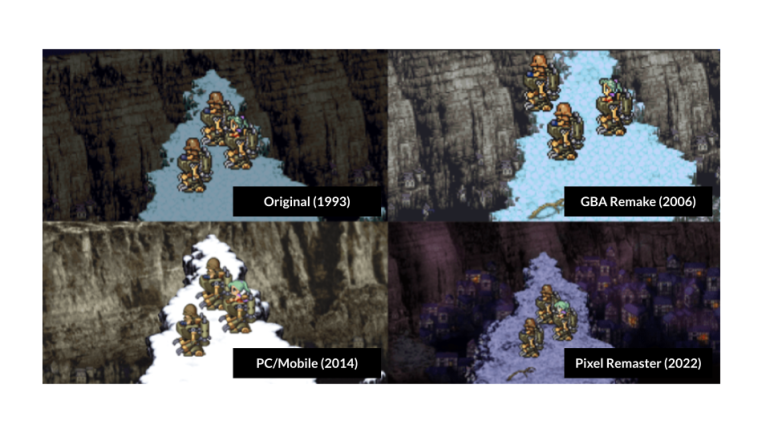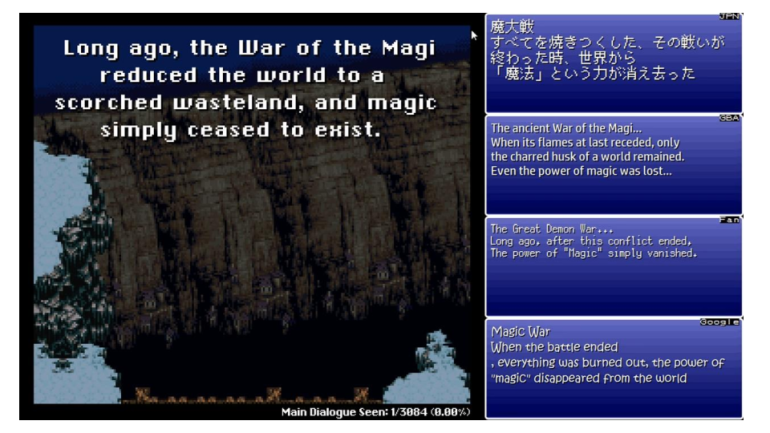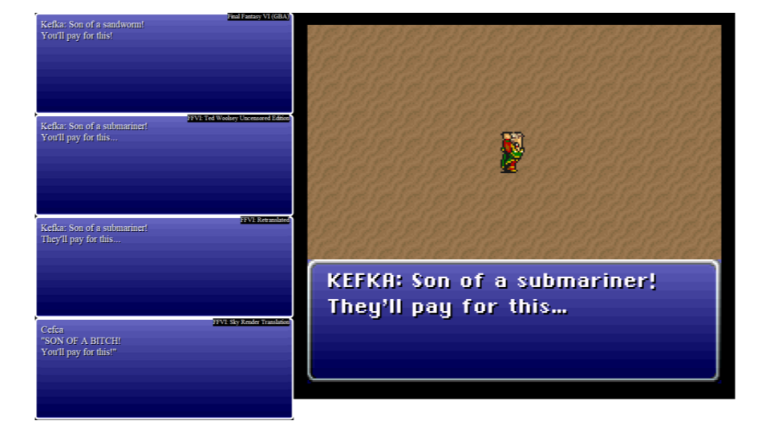 This past month, I presented my in-progress doctoral research at the Digital Games Research Association (DiGRA) annual conference. My dissertation explores the communities of maintenance surrounding the Super NES console and its software library—primarily through the investigation of unauthorised technologies, practices, and industries that have emerged following its release.
This past month, I presented my in-progress doctoral research at the Digital Games Research Association (DiGRA) annual conference. My dissertation explores the communities of maintenance surrounding the Super NES console and its software library—primarily through the investigation of unauthorised technologies, practices, and industries that have emerged following its release.
My doctoral work is still in its early stages, but I was excited to show off some of the methods I have used to compare fan retranslations of Final Fantasy III/VI. Scrutinising these retranslations can reveal the emergent, sometimes contentious, notions of authenticity that permeate Final Fantasy III/VI fan re-translation communities, with many videogame hackers claiming to repair, uncensor, or restore the game in various ways. These discourses are primarily concerned with undoing changes that occurred when the original Japanese release was localised for North American audiences, often citing censorship issues and uneven professional translations.
Of course, when staring down an enormous number of retranslations of the same game, I’m faced with an obvious question: “how does one go about studying them?” Luckily, the Final Fantasy III/VI hacking community has developed an extremely useful tool for exactly this sort of thing!
Wanderbar
In 2017, Clyde Mandelin (of Legends of Localization fame) created a unique application called Wanderbar, which he used to compare different translations of Nintendo games. Like many hacker-apps, Wanderbar is a complex assemblage of easily-sourced objects — a Super NES emulator called SNES9x, a ROM image of Final Fantasy III/VI, some custom scripts, and a collection of HTML files.
Mandelin first used Wanderbar to compare the English translation of Super Mario RPG with the original Japanese script live on a Twitch stream, by displaying the original Japanese in the sidebar while playing the English version of the game in the accompanying emulator. As Mandelin is fluent in Japanese and works as a professional translator, he was able to provide insights on the translation process during the playthrough, and has since completed similar streams with other games ranging from The Legend of Zelda: A Link to the Past to Breath of Fire 2.
Particularly useful for my own research is Mandelin’s development of a plugin for Wanderbar that focuses on Final Fantasy III/VI. He initially designed this iteration of the software for a Twitch stream that compared the text of the Super NES English translation, the original Japanese, the GBA re-translation, a fan translation, and a Google translation of the game’s text.
It took some finagling but, with help from Mandelin (who was very kind to share his software with me), I managed to reconfigure my own version of Wanderbar to simultaneously display two official game translations of Final Fantasy III/VI alongside the three fan retranslation hacks that I chose for my analysis. This involved using a ROM dumper to extract the text from each translation into a cleverly formatted HTML file. While the formatting for the text is not perfect (hex code is notoriously difficult to parse) it allowed me to play through the game once while reading all five translations simultaneously. In addition to be a major time-saver, this approach allowed me to directly compare each translation’s text in context, easily spotting similarities and divergences.
Early Findings
What have I learned by playing through five versions of Final Fantasy III/VI at once?
Interestingly, one of the biggest points of divergence between different fan re-translation projects seems to be the inclusion of elements from Ted Woolsey’s initial English translation of the game. Woolsey allegedly completed the entire game’s translation in a month, grappling with limited space on the game’s ROM (English text takes up more space than Japanese) and Nintendo’s censorship policies in North America. While many choices that Woolsey made were inaccurate or absurd, often using comical North American phrases or non sequiturs in dialogue, they have since become beloved in the game’s North American fandom. Kefka, the game’s main villain, is particularly well-known for spouting lines such as “son of a submariner” and calling the protagonists “miserable blockheads.” These so-called “Woolseyisms” are remarkably persistent and many fan re-translations try to preserve them. In fact, one of the most defining aspects of Ted Woolsey Uncensored Edition is how it uses the initial English translation as its primary source.
Also, in a weird bit of recursiveness, the official Game Boy Advance retranslation keeps many of these strange phrases, even though they are verifiably not accurate translations of the original Japanese. It appears that even Square Enix has recognized their beloved place in fan culture. Additionally, as more official and unofficial translations emerge, it becomes obvious that a truly “authentic” re-translation of Final Fantasy III/VI is forever out of reach. While official releases are, well, official, many fans are critical of them for their censorship, localization, and narrative tweaks. Literal translations of the original Japanese are critiqued for lacking nuance or omitting dialogue lines that, although based on incorrect translations, have become central to fan interpretations of narratives and characters. And it is rare for a fan retranslation to ever settle — they are iteratively tweaked as newer retranslation projects arise or a shift in consensus of “correct dialogue” occurs in the community. The discourses never settle and authenticity is forever fluid.
Additionally, as more official and unofficial translations emerge, it becomes obvious that a truly “authentic” re-translation of Final Fantasy III/VI is forever out of reach. While official releases are, well, official, many fans are critical of them for their censorship, localization, and narrative tweaks. Literal translations of the original Japanese are critiqued for lacking nuance or omitting dialogue lines that, although based on incorrect translations, have become central to fan interpretations of narratives and characters. And it is rare for a fan retranslation to ever settle — they are iteratively tweaked as newer retranslation projects arise or a shift in consensus of “correct dialogue” occurs in the community. The discourses never settle and authenticity is forever fluid.
I’ll be spending a lot more time with Final Fantasy III/VI in the coming months, but my first foray into documenting fan retranslation projects has been intriguing. If you’re interested in setting up your own Wanderbar implementation for a similar research project, feel free to email me or check out the project’s homepage.


